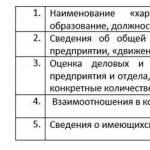Professions related to archeology. Archaeologist - pros and cons of the profession. Step-by-step action plan
An archaeologist is a historian who studies the life and culture of ancient people using various artifacts.
From Greek archaios - ancient and logos - teaching. The profession is suitable for those who are interested in history, world artistic culture, foreign languages and social studies (see choosing a profession based on interest in school subjects).
Archaeologist is a historian who studies the life and culture of ancient people using various artifacts.
Archeology is an applied part of history, along with source studies.
Features of the profession
Artifact in archeology (from lat. artefactum- artificially made) is an object created or processed by man.
Artifacts are also called material sources. These include buildings, tools, household utensils, jewelry, weapons, coals of an ancient fire, bones with traces of human impact and other evidence of human activity.
If there are writings on the artifacts, they are called written sources.
Material sources (as opposed to written ones) are silent. They contain no mention of historical events, and many were created long before the advent of writing. The archaeologist’s task is to create a picture of the past from the found fragments, relying on existing knowledge and finds, taking into account the location of the finds. By itself, a fragment of a jug or a knife handle says little. They cannot be considered out of context, i.e. in isolation of place, situation, depth of occurrence, objects found in the neighborhood, etc.
An archaeologist finds evidence of the past, and then examines it in the laboratory, classifies it, restores it if necessary, etc.
Archeology uses data and techniques from other disciplines:
humanities (ethnography, anthropology, linguistics) and natural sciences (physics, chemistry, botany, geography, soil science).
For example, to establish the time of creation or use of an object, they take into account in which layer it lay (each layer of soil corresponds to a certain time period), and use stratigraphic, comparative typological, radiocarbon dating, dendrochronological and other methods.
An archaeologist has no right to fantasies. All his conclusions must be supported by clear evidence.
Archaeologists usually specialize in certain regions and historical periods. For example, a scientist can become an expert on the Paleolithic era in Central Asia if he studies the Stone Age sites there year after year.
By search methods archeology can be divided into types:
Field - searching for artifacts using excavations on land;
Underwater - search underwater;
Experimental- reconstruction of objects of the past (tools, weapons, etc.).
During field excavations, the archaeologist uses a pick and shovel, a magnifying glass and a brush, a knife and a syringe. And also a georadar, a theodolite - when planning excavations, a camera - to document your finds, and other technical capabilities.
To work underwater, you must also be able to scuba dive and use underwater excavation equipment.
During the expedition, the archaeologist needs to describe each discovered object in as much detail as possible - this is important for further analysis. For the same purposes, you need to be able to sketch the find and take a photograph. And in some cases, right in the field, scientists carry out the initial restoration (conservation) of an artifact, because sunlight and fresh air can destroy jewelry that has lain in the ground for a thousand years. If it is not strengthened in time, it will crumble before reaching the laboratory.
In experimental archeology, the reconstruction of an object occurs using materials and technologies typical of the era being studied. During the experiment, scientists are trying to replicate the lifestyle of ancient people. They master crafts and restore forgotten technologies. Recreating an unknown technology, an archaeologist relies on excavation data, builds hypotheses, and conducts experiments. You can't do without engineering skills here.
Only by vocation
The work of an archaeologist is not only intense intellectual work. She demands physical strength and asceticism. Male archaeologists are often bearded, because on expeditions - in the heat and dust, far from civilization - it is not recommended to shave.
But for a real archaeologist, archaeological finds are a source of very strong emotions.
Archaeologist Natalya Viktorovna Polosmak speaks about his first archaeological experience:
“When I picked up my first small finds /.../ I saw that very close by, literally under our feet, a mysterious world of the past exists and lives according to its own laws. And if the era of great geographical discoveries is already behind us, then great historical discoveries are still waiting for us, because the Earth has preserved everything that man has left on it from century to century.”
(N.V. Polosmak - Doctor of Historical Sciences, specialist in archeology and ancient history Siberia. She took part in archaeological expeditions as a schoolgirl.)
According to archaeologist Sergei Vasilievich Beletsky, finds are often perceived as alive: “That is, when you understand that this thing was kept before you 100, 300, 500, 700 years, yes, this is serious.”
(S.V. Beletsky - Doctor of Historical Sciences. The main range of scientific interests is the archeology of Pskov.)
Workplace
An archaeologist can work in research institutes (for example, at the Institute of Archeology of the Russian Academy of Sciences), as well as teach in universities. His academic career, like that of other scientists, is expressed primarily in scientific discoveries, written works and academic titles.
Important qualities
In addition to interest in the events of the past, an archaeologist needs analytical and deductive abilities. To get a unified picture, you have to compare a lot of disparate data provided by excavations, laboratory studies, and the works of colleagues.
It doesn’t matter where the excavations take place - underwater or on land. In any case, this requires good physical endurance and sharp vision.
Knowledge and skills
Historical knowledge is necessary, especially important is knowledge of the era under study, knowledge in related fields: scientific restoration, paleosoil science, paleogeography, etc.
Often you have to study disciplines that are not directly related to archeology: anthropology, ethnography, heraldry, numismatics, textual criticism, heraldry, physics, chemistry, statistics.
In addition, you must have the skills of a surveyor and topographer.
And when working in the mountains or underwater, use the skills of a rock climber or diver. For this you have to undergo special training.
Archeology still has an aura of romance and exciting discoveries, which perhaps explains why you chose this course, for which this book is primarily intended. You will soon learn that archeology, while often fascinating and sometimes practiced in distant places, is a highly technical science in which spectacular discoveries are few and far between. It is true that discoveries such as the burial of Mochica rulers at Sipan or the Uluburun shipwreck sometimes make headlines, but the fact remains that most archaeologists work away from the public eye, often on unattractive and monotonous sites and on obscure problems. Of course, a character like Indiana Jones is not suitable for archaeology. And he never did. Indiana Jones is a complete fiction, a character based on the stories of well-known early 20th century archaeologists whose discoveries and adventures were truly larger than life. Today's archaeologist is a far cry from Professor Jones and works far from the halls of academia. So what qualities make a good archaeologist in these days of highly specialized research and a wide range of career options? Character traits are as important as academic preparation, otherwise you will not succeed as an archaeologist. This profession has its own unique advantages. Money is not one of them (see box “The Practice of Archaeology”).
If you decide to become an archaeologist
Many people become archaeologists almost by accident. A little field experience during their studies could be of interest and they would want something more. One becomes an archaeologist differently than one becomes a priest, a nurse, or a military man - in these cases, a greater initial interest is required. You can ease your way into your specialty while having fun.
Almost everyone who works in archeology today either encountered it in school or became interested in it by taking an introductory archeology course as a subject at college or university. Many are lucky - they got a good teacher - one of those who sparks interest in a specialty about which they previously knew nothing. So, what to do if you have an interest in the past?
PRACTICE OF ARCHEOLOGY
PERSONAL QUALITIES REQUIRED FROM AN ARCHAEOLOGISTAnyone who wants to become an archaeologist needs much more than a university degree. Here are some required qualities.
Enthusiasm, even a passion for archeology and the past is the main thing for anyone who goes into the field. Archeology is driven by passion, the best archaeologists are those who have a kind of “fire in their chest” that gives them the strength to overcome practical obstacles and routine, get money and get the job done. Personal charisma produces good archaeological leaders, provided they have the patience to do the little things.
Infinite Patience during field and other work where slow, methodical, frequently repeated actions are required. Sometimes you have to deal with difficult people.
Attention to detail. There are a lot of little things and details in archeology - you need to not miss the tiny features of a stone tool or clay shard, you need to study tiny fragments of the past for weeks, analyze computer data. Both excavations and other research, not to mention laboratory work, require the greatest patience and a desire to scrupulously delve into the details.
Adaptability, the ability to adapt to long journeys, to adapt to uncomfortable working conditions in the field and to primitive living conditions. You need to be prepared to travel long distances and be able to show ingenuity in difficult and sometimes extreme conditions. Imagine, for example, that your Land Rover broke down several hundred kilometers from the nearest service station.
Developed organizational skills, because in archeology big role Logistics and organization of field teams, maintaining archives, even kitchens in the camp play a role. Organizational abilities are a great asset.
Sensitivity to other cultures and forms of existence, as well as the ability to communicate simply necessary. Many successful practicing archaeologists spend a lot of time working and communicating with Native Americans and other peoples. This requires patience and sensitivity, which in the long run will be of undoubted benefit, and not only in professionally. This is one of the reasons why knowledge of the basics of anthropology is so important for an archaeologist.
Commitment is also required ethical standards archeology. Don't try to become a professional unless you are willing to follow the rules, some of which are outlined in Chapter 2.
Sense of humor really very important. Because many archaeologists take themselves too seriously. You haven't had to work on an article for a whole week and suddenly your computer crashes. And you didn't save the text. Such cases occur with enviable regularity during field research. This is why a sense of humor is required, because in professional activity It's quite rare that things go as planned.
The most important traits are enthusiasm and dedication. They will help you get through almost anything.
First, take as many archeology courses as possible, taught by different teachers. Start with a fundamental course, in which the methods and theories used are most fully disclosed and systematized. (If it doesn't discourage you from continuing, then you're on the right track, since these courses aren't particularly exciting.) Then, to get a sense of which major topics in archaeology interest you and which ones you don't, choose a range of courses covering whole areas. areas. Do not forget that if you are aiming for graduate school, then you need to understand which area the topic of your future dissertation will be devoted to.
Second, try to gain as broad a knowledge as possible of general biological and cultural anthropology in order to narrow your area of interest and understand whether you are more interested in people of the present or the past. If you continue on your path to becoming a professional, you will never regret the time you put into it.
Third, take as many courses in related disciplines as possible. This will develop your understanding of the multidisciplinary nature of archaeology. For example, one of the most interesting and important problems in archeology is the emergence Agriculture, and approaching its resolution can only be done from a multidisciplinary perspective. Most projects within cultural resource management are multidisciplinary in nature.
And lastly, gain experience working in the field and in laboratories while still a student. Such experience, especially of a general nature, is useful for those applying for graduate school. And even more importantly, it will allow you to experience the challenges and realities of working in the field and in the laboratory before it becomes your job (and graduate school should be viewed as just that - a job).
If you take the time to gain work experience in archeology as an undergraduate, you will be well prepared for graduate school and pursuing a professional career.
Field work experience
“How can I take part in the excavations?” - we are often asked this question, especially by junior students. The good news is that there are more opportunities to work in the fields now than before. As long as you put some effort into finding them. Start by taking a fieldwork course if your department offers one, use your personal contacts, and look on the bulletin board (see the section on "Practicing Archaeology").
Not now best time become an academic archaeologist, since there are few places and the competition is high. But it is an excellent time to consider a career as an archaeologist in the public or private sectors, which account for much of the research in North America.
Academic archeology. This area is on the verge of extinction. Until a generation ago, almost all archaeologists were members of academic institutions or worked in research institutes and museums. Purely academic archeology still dominates the training of both undergraduate and graduate students. Many young people entering educational institutions have a strong intention of becoming a “traditional” scientist. But the growth in academic career is very slow now. Some programs are being cut (Zeitlin, 1997).
PRACTICE OF ARCHEOLOGY
OPPORTUNITIES TO PARTICIPATE IN FIELD RESEARCHThere are many such opportunities if you bother and look for them. Here are some options:
Volunteer to participate in excavations or surveys conducted by your own institute. Ask your teachers, when they see that you have serious intentions, they may well invite you to work in the field or in the laboratory.
Voluntary field work sponsored by local or national organizations, such as a historical society, museum, or government agency. Many of our students have worked as interns for the National Park Service and other organizations. The Internet, as well as your department's notice board, can be a useful source of information. See the list of information sources at the end of the chapter.
Visiting field schools. Many institutions sponsor summer credit field schools. The best schools are very popular, and you can get into them on a competitive basis. Field schools are useful because they combine excavation, laboratory work, and academic teaching. The camaraderie in such establishments can be remembered for a long time. Very often, the experience of passing such a school helps to obtain qualifications that allow you to get a summer job at a research institute or private company. The American Archaeological Society (see the end of the chapter for useful addresses) sends mailings, including to your faculty. Choose your field school carefully! Not all are the same and you should consult with your instructors before making a decision. I warn you, beware of field schools that offer to participate in excavations in distant countries, especially in the eastern Mediterranean, they charge high fees and use students as unskilled labor, you will not learn anything there. Before signing the documents, insist on being given details of previous students and contact them.
Participation in professional excavations abroad. The Archaeological Institute of America and the British Archaeological Council (see useful addresses) provide lists of professional excavations where serious volunteers are invited. Sometimes they provide cheap or even free housing.
Volunteer to participate in excavations as part of cultural resource management projects. This is where many of our students get their first fieldwork experience. This is first voluntary and then paid work. It's definitely worth checking out private companies working in this area in your area, as well as checking with your professors who may have such information.
Majority archaeological research in North America and many parts of Europe is now carried out as part of RBM projects, many of which are carried out in accordance with legal requirements. This means that more and more (of course not all) academic archaeological projects at American universities are being conducted outside the United States, but in Europe, Central America, and the Andes. In established fields such as Central American studies, there is intense competition for rare academic positions and even more applicants for academic positions in North American archeology.
Only 35% of American archaeologists work on academic projects, and this number is declining every year (Zeitlin, 1997). The bottom line is simple: if you want to become an academic archaeologist, prepare to specialize or work in areas where there are already too many specialists, and leave your many skills in reserve.
Work in museums is difficult to find, especially purely research work. Working in museums is good and requires special skills in conservation, organizing exhibitions, and preserving collections.
Cultural Resource Management and Community Archeology. There are almost unlimited opportunities available for people wishing to pursue a career in the conservation and management of archaeological resources (Green and Doershuk, 1998). The greatest opportunities for an archaeologist are in public archeology and the private sector, where the problems being solved are much more complex than traditional academic problems.
If you are interested in public archeology or RBM, you have the choice of working for a government or non-government organization involved in RBM projects. These organizations may be non-profit, affiliated with a museum or university, or for-profit, operating exclusively in the private sector. The latter may vary in organization and size. Large companies can offer good opportunities and prospects, especially for budding archaeologists. Most of the activities of public archeology are carried out by state-owned companies, although there are also private firms.
If you choose the public sector, you will have opportunities to work for many federal government agencies, such as the National Park Service and the Bureau of Land Management. Many archaeologists work on archaeological projects commissioned by states or historical societies. For example, the Ohio State Historical Society often employs archaeologists.
The profession of an archaeologist is one of those few specialties that are shrouded in an aura of romance, mystery and, if you like, even mysticism. In the minds of many, archaeologists are akin to treasure hunters, with the only difference being that for the former, the search for ancient artifacts is “art for art’s sake,” and for the latter, the main goal is profit. Due to their lack of self-interest, archaeologists are often perceived as eccentrics, out of touch with reality and mired in the affairs of bygone days.
Archaeologist profession refers to those few specialties that are shrouded in an aura of romance, mystery and, if you like, even mysticism. In the minds of many, archaeologists are akin to treasure hunters, with the only difference being that for the former, the search for ancient artifacts is “art for art’s sake,” and for the latter, the main goal is profit. Due to their lack of self-interest, archaeologists are often perceived as eccentrics, out of touch with reality and mired in the affairs of bygone days.
It should be noted that archeology belongs to those areas of science that do not tolerate random people. That is why people who want to become archaeologists need to carefully familiarize themselves with the features of this profession, and only then decide whether it is suitable for them or not.
What is an archaeologist?

– a scientist engaged in excavations of ancient settlements and the study of artifacts (material sources) found during excavations, which make it possible to recreate the life and culture of people different eras. The name of the profession comes from the Greek "archaios" (ancient) and logos (study) - that is, the study of the ancient.
The first archaeologist can be considered the great poet and thinker Lucretius, who back in the 1st century BC. was able to determine that the Stone Age was replaced by the Bronze Age, and the Bronze Age was replaced by the Iron Age. The term "archaeology" was first used by Plato, who thus designated the "history of past times."
IN modern world archeology is usually divided into three types:
- field – excavation of material sources on land;
- underwater - searching for evidence of the past under water;
- experimental - reconstruction of objects used by ancient people, using materials and technologies characteristic of the era under study.
Archaeologists themselves, as a rule, can be divided into groups of specialists involved in the study of specific regions and historical periods. For example, there is a group of scientists dedicated exclusively to the study of the Paleolithic era in Central Asia.
The main task of an archaeologist is to search for artifacts, followed by their examination in the laboratory, restoration (if necessary) and drawing conclusions based on the facts identified. The task of archaeologists also includes the preservation of the found material sources, their classification and description.
What personal qualities should an archaeologist have?
Archaeologist's work Only true enthusiasts can do it, for whom excavations and the study of antiquities are a calling, and not random episodes in life. A true archaeologist must have such personal qualities, How:
- sincere love of history;
- a tendency towards asceticism;
- physical endurance;
- equilibrium;
- Analytical mind;
- ability to work in a team;
- excellent health;
- patience;
- predisposition to deduction.
Well, and most importantly, since archaeologists very often have to master not only related professions (soil science, topography, geography, etc.), but also specialties far from archeology(anthropology, chemistry, heraldry, etc.), a true fan of his field is distinguished by a pronounced thirst for new knowledge and skills, as well as the ability to educate himself.
Advantages of being an archaeologist

The obvious, and perhaps the only advantage of being an archaeologist, is, of course, the opportunity to travel a lot and for a long time in the company of like-minded people. In addition, an archaeologist spends most of his time outdoors, which can also be considered an advantage of this profession. To some extent, an irregular work schedule can also be considered an advantage, but only conditionally, since most often excavations take up most of the day, and not vice versa.
We were unable to identify any more advantages of this profession. Perhaps it was precisely the insignificant number of advantages that was the reason for the constantly declining demand for this specialty among applicants.
Disadvantages of being an archaeologist
In contrast to the advantages, the disadvantages of archaeologist profession, as they say, more than enough. Therefore, we will list only the most obvious and significant ones.
- Firstly, archeology is not so much exciting trips and great discoveries, but very hard and routine work. Let us emphasize that it is physically difficult work, which sometimes even strong men cannot cope with on their own.
- Secondly, low earnings (and sometimes their complete absence) due to insignificant funding for excavations and research of artifacts.
- Third, long years, spent in “Spartan” conditions - sometimes archaeologists have to sleep almost on bare ground and eat the gifts of nature.
- Fourthly, there is a high probability that the “great discovery” will be made by someone else, but not by you (that is, there may be a feeling that life has been lived in vain).
- Fifthly, long archaeological expeditions that interfere with building a normal personal life.
Where can you get a profession as an archaeologist?

The profession of an archaeologist requires a higher academic education. Moreover, we immediately note that study to be an archaeologist(as well as working in your specialty) is not very easy. The main emphasis in the learning process is on the study of history, as well as on the technologies of excavation and working with found artifacts. Since there are practically no special archaeological universities in Russia (except for the Institute of Archeology of the Russian Academy of Sciences and the Moscow Archaeological Institute), in order to obtain the profession of an archaeologist, you must choose a university with a history department, which has an archeology department. We recommend giving preference to universities such as:
Archaeologist
Archaeologists are scientists who study the life and culture of ancient civilizations on the basis of the preserved remains of their life. In the work of an archaeologist, the main task is to conduct excavations in order to find sources of research. Archeology is in many ways reminiscent of the work of a detective, when, putting together a whole picture from mosaic pieces, scientists try to solve the mysteries of the past and recreate the image of a bygone world. This requires imagination and developed abstract thinking, so this profession can be called creative. Archaeologists also need patience, the desire to achieve a goal, and perseverance, because sometimes it takes years and decades to uncover the secrets of a disappeared civilization or historical monument.
History of the emergence of the profession of Archaeologist How did the profession originate? How did the profession develop?
Also in Ancient Greece and in Rome, the profession of archaeologist was known and popular. Already at that time, people were engaged in excavations, found ancient architectural monuments, and knew about the Stone, Iron and Bronze Ages. During the Renaissance, numerous excavations were aimed at searching for works of ancient sculpture. But as a science, archeology was formed only at the beginning of the twentieth century.
Significance to society Importance, meaning and social status of the profession
In the modern world, archeology is a very significant science that allows you to discover many secrets and mysteries of past centuries, get to know bygone civilizations better, get acquainted with the culture, life and way of life of people of different eras - from antiquity to today, recreate from the remains appearance ancient plants and animals. In their research, archaeologists use various methods to analyze and study objects, which can be optimized by cooperation with branches of other sciences. The profession of an archaeologist is in great demand today, because in the history of mankind there are so many mysteries, undiscovered secrets and blind spots.
Features of the Archaeologist profession Uniqueness and prospects of the profession
The main activity of an archaeologist is excavations, the purpose of which is to search for cultural objects, ancient monuments, and other objects of historical significance. In addition, archaeologists may work in a museum and organize exhibitions and tours, ensure the preservation and restoration of objects found during excavations, or introduce visitors to these finds and research results.
"Pitfalls" of the Archaeologist profession All the pros and cons of the profession. Difficulties and features.
An archaeologist must have good health, endurance, and be well physically prepared, because the work involves archaeological expeditions in different climates. A person who has chosen this profession should not have allergic reactions, especially to materials of organic origin. The work of an archaeologist can be either individual or team work, so emotional preparedness, balance, and calm are very important.
Where and how to get a profession Archaeologist Where do they teach professions?
The profession of an archaeologist can be obtained by graduating from the history department of a university. In order to work in this specialty, you must have a higher academic education. This will also allow for the management of archaeological excavations and archaeological supervision.
You will need
- - medical card;
- - certificates of Unified State Examination results in subjects required for admission to the Faculty of History;
- - a computer with Internet access.
Instructions
Make sure that you do not have any medical conditions that could hinder your desire to become an archaeologist. An archaeologist must have a healthy heart, he must not suffer from hypertension, seizures, hearing or speech disorders. Obstacles include diabetes mellitus, hemorrhoids, some skin diseases, severely decreased vision with the impossibility of correction, diseases of the digestive system and excretory system, as well as infectious diseases which have become chronic. An archaeologist should not suffer from drug or alcohol addiction. Get examined and consult with your local doctor.
Archeology is a specialization that is obtained in senior years of history departments. There is also a specialized university that has branches in different cities of Russia - the Moscow Archaeological Institute. You can begin preparing for future scientific activity in college (in particular, a pedagogical college with a social orientation). You need specialty 050401 – History. But in the future you will still have to enter higher education. educational institution.
If you want to go to college immediately after school, carefully study not only history and the subjects required to obtain a certificate, but also disciplines such as physics, chemistry and geography. All these sciences will be useful to you in your work. The ability to draw and work with a camera will also be very useful. You can find out for which academic disciplines you will need certificates on the website of the higher education institution after February 1, but in any case you will need a certificate.
Type the following specialties in the search engine: 030400, 030401, 050401 - History or 030402 - Historical and archival studies. Look at which universities you can get these specialties with the qualification “history”, “master of history” or “history teacher”. Choose one that has an archeology department. After specializing in this department, you can obtain qualification 72251 – Archeology.
note
If for some reason you were unable to enroll in a specialized educational institution, you can still take up archeology. In particular, the military one. To do this, just sign up for a search team, which is available in any large city, as well as in many villages. Search engines are primarily engaged in searching for the remains of military personnel who died during the Great Patriotic War. Patriotic War. This is a fascinating and useful hobby. However, for many former military men it becomes a real profession. If you wish, you can create your own search party by registering it with the Search Squad Foundation. Remember that this hobby requires discipline, accuracy, good knowledge of the history of the places where excavations are being carried out, and some special skills.
Archaeological expeditions require not only scientists. Every year they recruit people who are ready for hard physical labor. You don’t need any special qualifications for this; anyone who is fit for health can get a job. Be prepared to do a lot of shoveling every day. They will tell you how to do this if you are accepted into the expedition. Working on excavations is excellent practice for history students who are still preparing to choose a specialization.





